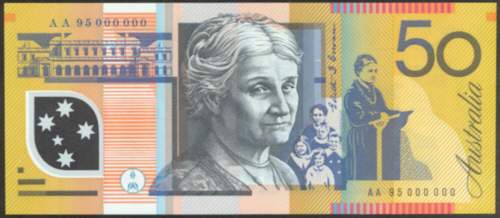This is an Australian $50 note.
Or it isn’t.
It might be one of the counterfeit notes I’ve been hearing so much about; they’re so realistic that even our banks have been distributing them without realising. Fortunately, I’ve come up with a little work around; when I withdraw cash from an ATM I’ll ask for multiples of 20 ($40, $60, $80) because I know that won’t include a $50 note.
Mind you, for all I know I’ve been using fake money for ages and although I understand the damage this does to our economy, I can’t say I’ve personally suffered any direct financial loss or embarrassment as a result. But I still don’t like the idea of having one in my pocket, so I’m treating all $50s as suspect… because now they all look fake to me.
Which has got me thinking. Firstly I’m surprised how quickly the mere prospect of being deceived or cheated has undermined my trust in something I’ve relied on for decades; I’m not a naturally suspicious person so if I’ve reacted this way I can only imagine how a more jaded individual might respond.
Trust takes ages to build and seconds to lose.
But the notion of funny money has introduced me to yet another reason why some people resist change: could it be because they’ve already been conned by a counterfeit? Every politician, CEO and guru promises change but few (if any) ever deliver and it doesn’t take too many broken hopes before we all start getting a little cynical. So when the next visionary leader comes along and dares us to dream of a bigger, brighter tomorrow it’s only natural that we resist, if only to protect ourselves from yet another letdown.
We’ve heard this all before. Word for word.
Of course that means we risk tearing up something of real value; we might miss the opportunity for real change but at least we won’t be disappointed by the fake kind. And whenever we reject the genuine article it fails, thereby confirming our verdict that it was phony all along.
So are we really against change? Or just sick of the counterfeit?

There are No Responses to this post. Jump In!